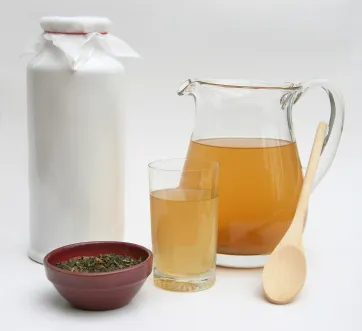
Kombucha
Makes 1 gallon
3 quarts filtered water
1 cup sugar
4 tea bags of organic black tea
1/2 cup kombucha from a previous culture*
1 kombucha mushroom**
Bring 3 quarts filtered water to boil. Add sugar and optional salt and simmer until dissolved. Remove from heat, add the tea bags and allow the tea to steep until water has completely cooled. Remove tea bags. Pour cooled liquid into a 4-quart glass bowl and add _ cup kombucha from previous batch. Place the mushroom on top of the liquid. Make a crisscross over the bowl with masking tape, cover loosely with a cloth or towel and transfer to a warm, dark place, away from contaminants and insects. In about 7 to 10 days the kombucha will be ready, depending on the temperature. It should be rather sour and possibly fizzy, with no taste of tea remaining. Transfer to covered glass containers and store in the refrigerator. (Note: Do not wash kombucha bowls in the dishwasher.)
When the kombucha is ready, your mushroom will have grown a second spongy pancake. This can be used to make other batches or given away to friends. Store fresh mushrooms in the refrigerator in a glass or stainless steal container-never plastic. A kombucha mushroom can be used dozens of times. If it begins to turn black, or if the resulting kombucha doesn’t sour properly, it’s a sign that the culture has become contaminated. When this happens, it’s best to throw away all your mushrooms and order a new clean one.
Note: White sugar, rather than honey or Rapadura and black tea, rather than flavored teas, give the highest amounts of glucuronic acid. Non-organic tea is high in fluoride so always use organic tea.
A word of caution: Some individuals may have an allergic reaction to kombucha. If you have allergies, start with a small taste to observe any adverse effects. If you react badly, use beat kvass several weeks to detoxify and then try again.
*If you have no starter from a previous batch, you can use a store-bought kombucha drink as your starter.
**G.E.M. Cultures, http://www.gemcultures.com/kombucha.htm
Happy Herbalist, http://www.happyherbalist.com/kombuchamushroom.aspx
Reprinted with permission from Nourishing Traditions, by Sally Fallon with Mary Enig, Ph.D.

